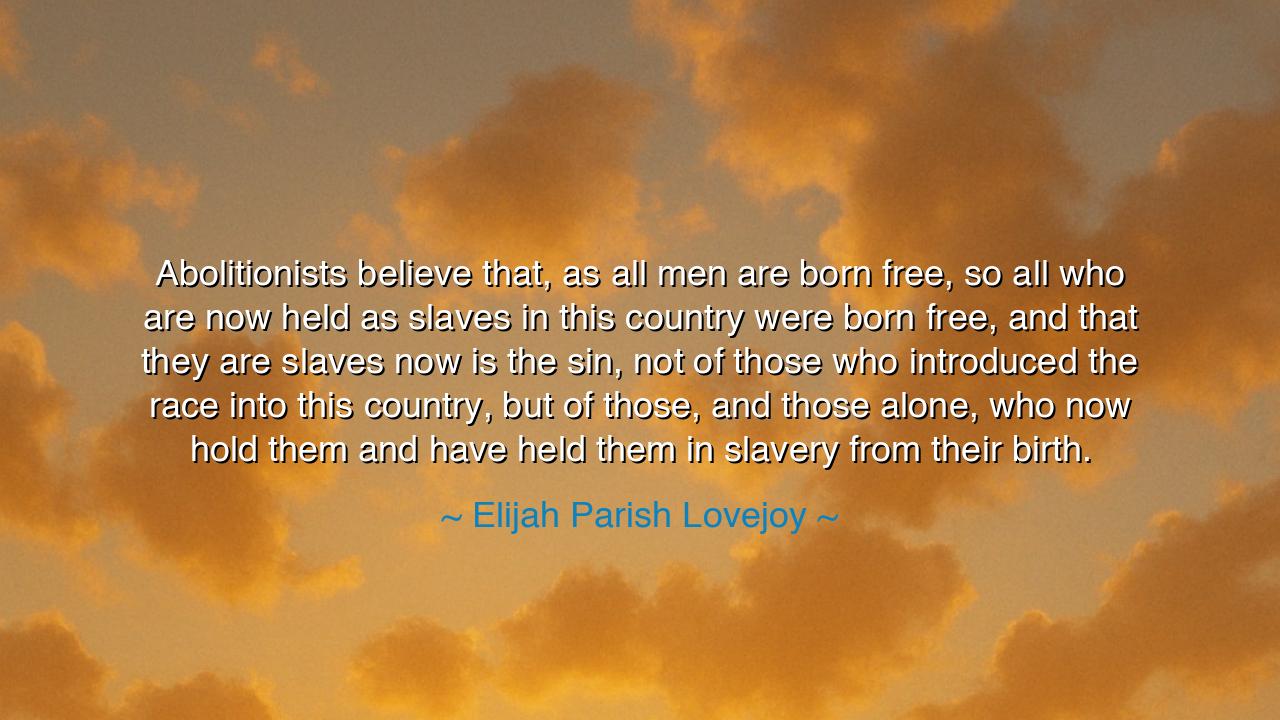
Abolitionists believe that, as all men are born free, so all who
Abolitionists believe that, as all men are born free, so all who are now held as slaves in this country were born free, and that they are slaves now is the sin, not of those who introduced the race into this country, but of those, and those alone, who now hold them and have held them in slavery from their birth.






In the thunderous and righteous words of Elijah Parish Lovejoy, he declared: “Abolitionists believe that, as all men are born free, so all who are now held as slaves in this country were born free, and that they are slaves now is the sin, not of those who introduced the race into this country, but of those, and those alone, who now hold them and have held them in slavery from their birth.” These words were not written from comfort, but from the fire of conviction — spoken by a man who would give his life for the liberty of others. Lovejoy’s voice rose in an age of bondage and moral blindness, and his words still ring as both an accusation and a plea: that freedom is the natural state of man, and to deny it is not only cruelty, but sin.
When Lovejoy says that “all men are born free,” he speaks from the moral foundation upon which all justice rests. This was not a new belief, but the eternal truth proclaimed by prophets and reformers across the ages — that liberty is not a gift bestowed by governments or masters, but a divine birthright written into the very fabric of creation. Yet, he goes further: he identifies that the guilt of slavery does not belong to history alone. It is not the sin of those long dead, but of those living in the present who sustain injustice by their silence or complicity. Thus, he lays a charge not upon the past, but upon the conscience of the living — a message that still burns with relevance in every age where oppression survives.
The origin of this quote lies in the 1830s, when Elijah Lovejoy stood as one of the most fearless voices of the abolitionist movement in America. A Presbyterian minister and newspaper editor, he published truths that many feared to speak — truths about the evil of slavery, the humanity of the enslaved, and the hypocrisy of a nation claiming liberty while practicing bondage. For these convictions, his presses were destroyed again and again by mobs. But he rebuilt them, refusing to be silenced. Finally, in 1837, in Alton, Illinois, Lovejoy was murdered defending his printing press — dying, as many said, the first martyr for the freedom of the press and the abolition of slavery. His blood sealed his words with immortal authority.
To understand the weight of his message, we must see what he saw: a society that excused its sins by pointing backward, claiming innocence because others had begun the evil. Lovejoy shattered this comfort. He declared that to perpetuate injustice is to be its author anew. He held a mirror before the nation, forcing it to confront that sin continues wherever conscience sleeps. In his time, this truth was directed at those who profited from slavery; in our time, it calls to anyone who benefits from inequality yet does nothing to end it. The chains may change form, but the moral blindness remains the same.
His belief that “steady work for justice” is both a moral and spiritual duty ties him to the great lineage of prophetic voices — men like William Wilberforce in Britain and Frederick Douglass in America — who saw liberty not as politics, but as the expression of divine order. They understood that oppression degrades both the oppressed and the oppressor; that every human soul bound by chains lessens the light of all mankind. Lovejoy’s courage reminds us that moral truth is not measured by its popularity, but by its righteousness — and that the one who stands for justice, even alone, stands with eternity.
There is a lesson here for every generation: evil endures not only through action but through inaction. Lovejoy’s life teaches that silence in the face of injustice is itself a sin, for to refuse to resist is to consent. Whether the chains are of slavery, poverty, prejudice, or oppression of any kind, the duty of every free soul is to strike at them — not with hatred, but with faith, courage, and truth. His call is not merely to protest but to awaken: to remind humanity that freedom is not a privilege to be earned, but a right that must be protected, again and again, in every age.
So let this be the teaching: freedom is sacred, and justice demands courage. Do not look to the sins of history as though they belong to others; ask instead what injustices persist in your own time and what you will do to end them. Speak when it is dangerous to speak, stand when others kneel before falsehood, and act when silence seems safer. For, as Lovejoy showed through his words and his death, the struggle for righteousness never ends — and every blow struck for truth molds not only the moment but the moral destiny of mankind.
Thus, the legacy of Elijah Parish Lovejoy endures like a torch passed through the centuries: a flame of conscience, a warning against apathy, and a hymn to the eternal dignity of man. He teaches us that liberty is not granted by rulers, nor preserved by words alone, but upheld by those who dare to live — and if need be, to die — for what is right.






AAdministratorAdministrator
Welcome, honored guests. Please leave a comment, we will respond soon